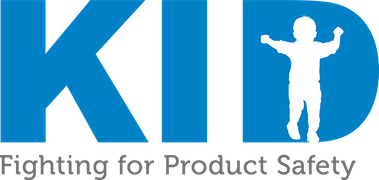KID research shows missed opportunities to reach consumers with recall news
[vc_row][vc_column][vc_column_text]
For Immediate Release: September 5, 2019
Contact: Nancy Cowles 312.595.0649 (o)/312.218.5593 (c)/ nancy@kidsindanger.org
View photos from the press event and share on Facebook, Twitter, and Instagram
KID Report: Companies Not Doing Enough to Publicize Recalls, Can Lead to More Injuries CPSC Errors Make Recall Process Harder, According to New Report
(CHICAGO) Kids In Danger (KID) released a new report today detailing missed opportunities in sharing recall information. Specifically, the report delves into the data on companies’ websites and social media presence and whether they use those platforms to share information about children’s product recalls to make the recall process easier.
KID found that between July 2017 and June 2019, 122 children’s products were recalled by the U.S. Consumer Product Safety Commission (CPSC). In an analysis of the 117 companies whose CPSC press release included a website, only 76 (65%) of those websites mentioned anything about the product recall. Websites are typically an easier and more accessible format for claiming a recall than calling a company phone number. Customers should have the option of phone, web-based, or email participation to increase their access to recall participation.
Additionally, information about recalls is not being appropriately shared with customers. In the age of social media, most companies have Facebook, Instagram, and Twitter accounts, but these are not being used to their full capacity. For example, 87 of the 122 companies (71%) had Facebook pages, but only 54% of companies with a Facebook page (38% of all recalls) posted about the recall. Overall, only 48% of recalls between July 2017 and June 2019 were promoted on the recalling companies’ social media accounts. Fifty-two percent of recalling companies didn’t post on social media at all. When consumers aren’t aware of recalls, they continue to use dangerous products, which puts families at risk.
KID also identified an issue with CPSC’s press releases for the recalls. Some of the websites listed on recall pages link to entirely different and unrelated pages, meaning customers need to work even harder to find the correct website. The chances of recalled products staying in homes and child care facilities increase if a consumer cannot find the recall participation information.
KID makes the following recommendations
- Establish a CPSC mandate for companies to provide a recall webpage to ensure that everyone who bought a recalled product has easy access to information to participate in the recall remedy. In addition, companies should be encouraged to use robust methods to reach consumers through social media and direct communication.
- The CPSC must make stronger efforts to assure that the company website provides information allowing the consumer to participate in the recall. In addition to the incorrect sites, we also found links that simply sent the consumer back to the CPSC announcement in an endless loop.
“Companies can do a lot to make recalls effective. But at the very least, clear details about the recall and how to participate should be readily available on the firm’s website. It was disheartening to see that CPSC doesn’t even enforce this basic requirement,” said Nancy Cowles, Executive Director of KID.
This and other basic requirements need to be reexamined so that the recall system is more effective at sharing information and stopping preventable injuries.
Visit kidsindanger.org for more information, and read the full report here.
—
Kids In Danger (KID) is a nonprofit organization dedicated to protecting children by fighting for product safety. KID was founded in 1998 by the parents of sixteen-month-old Danny Keysar who died in his Chicago childcare home when a portable crib collapsed around his neck.
[/vc_column_text][/vc_column][/vc_row]
